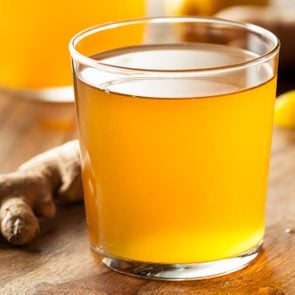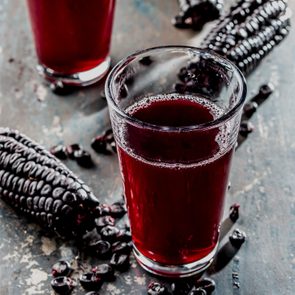7 Best Kombucha Brands, According to RDs
Updated: Jan. 26, 2021
Use this cheat sheet to choose the tastiest—and most nutritious—kombucha brands, all hand-picked by registered dietitians.
Our editors and experts handpick every product we feature. We may earn a commission from your purchases.
What is kombucha?
Perhaps you’ve seen kombucha on grocery store shelves and restaurant menus, but maybe you haven’t tried the beverage—or don’t know exactly what it is. Kombucha is a fermented beverage made from a base of tea, bacteria, yeast, and sugar.
Because kombucha is a fermented tea, you get the benefits of tea (hello, antioxidants), as well as potential probiotics, which can help gut health. Kombucha contains lactic-acid bacteria, according to a study in Microbiology, and it’s believed that these bacteria could potentially offer probiotic benefits. (These are the best probiotic foods for gut bacteria.)
“Kombucha is sweet but not overly sweet, is carbonated, and has a touch of caffeine and a slight vinegary flavor,” says Megan Byrd, RD, a registered dietitian based in Keizer, Oregon. Because of other ingredients often used to make kombucha, the drink can be quite sweet without much added sugar. Some kombucha is made with fruit or herb juice—for instance, lemon juice, apple juice, or ginger juice—for additional flavor and sweetness. (Like kombucha? Try this tepache recipe.)
How kombucha is made
To create kombucha, a sugary tea is combined with a symbiotic culture of bacteria and yeast (called SCOBY). Together with yeast, the SCOBY bacteria removes most of the sugar from the tea—resulting in the bubbly, fermented tea that is kombucha. One major draw of kombucha is it’s pretty low in calories and is mostly non-alcoholic, although hard kombucha is becoming more and more prevalent.
“Kombucha makes a great, lower-calorie, lower-sugar alternative to soda,” says Jessie Valentine, a registered dietitian in Port Washington, New York. Most kombucha falls between 10 and 80 calories per bottle.
Health benefits of kombucha
When you hear about kombucha, you’ll hear a lot about probiotics. But here’s the bottom line: Science is iffy on whether kombucha naturally contains probiotics, though many kombucha beverages have probiotics added to the drink during processing. (Here are nutritionist-reviewed probiotics they trust.)
One thing that is for sure: Kombucha boasts polyphenols, thanks to its base of tea. “Polyphenols act as strong antioxidants in the body and decrease inflammation, the root cause of many chronic diseases,” says Priscila Ruiz, RD, in Portland, Oregon. (Here are some more kombucha benefits.)
How to choose a quality kombucha
You should consider several things when picking out a kombucha. First, look at how the drink is bottled. “When choosing kombucha, the darker the bottle, the better,” says Ruiz. “This is because probiotics are damaged when they are exposed to light for long periods of time.” (See probiotic-filled foods you need to work into your diet.)
Then, look at the nutrition facts label. “Ideally, you want a kombucha that has a small amount of sugar, which is necessary for the fermentation process,” says Valentine. You’ll find kombucha drinks with as little as 8 grams of added sugar per 12-ounce can. If live cultures and/or probiotics are important to you, look for their addition to the ingredients list.
Some kombucha is sweetened with sugar alcohols. And some people experience gastrointestinal distress from these. If that’s you, avoid those ingredients. (Take a look at these best foods and recipes for gut health.)
Also, don’t worry if you see something floating in your drink. “When purchasing kombucha, the presence of floating fungus-looking particles can be completely normal,” says Valentine. “These are part of the SCOBY that forms the kombucha. But you want to steer clear of any black, green, or moldy-looking particles,” she says.
Who should avoid drinking kombucha
Remember that most kombucha contains a small amount of alcohol. Anyone with a history of alcohol dependence will likely want to avoid the beverage.
Kombucha may also not be a good choice for pregnant or breastfeeding women because of the drink’s alcohol content and also the fact that some kombucha is unpasteurized. Pasteurization kills off harmful bacteria, which can threaten a pregnancy.
Best kombucha brands to buy

Health-Ade Kombucha Ginger Lemon
$48 per 12 bottles
“I really like Health-Ade Kombucha, which has less added sugar than some other brands I’ve seen,” says New York City-based registered dietitian Samantha Cassetty, and co-author of Sugar Shock. The Ginger Lemon contains 8 grams of added sugar, or two teaspoons, for the whole bottle.
“People often think they have to completely avoid added sugars, but that’s not necessary,” she says. “Kombucha is a great replacement for sugary beverages, like soda. Soda has four times as much added sugar as kombucha, and it doesn’t offer any health benefits.”
(Looking for a new tea to try? Check out these nettle tea benefits.)

Rowdy Mermaid Kombucha Rowdy Belly
$48 per 12 bottles
“Rowdy Mermaid kombucha has a nice, mild flavor and isn’t overly sweet,” says Denver-based dietitian Leanne Ray. “It also contains interesting functional ingredients like turmeric. It’s a great base for mocktails when you want something special without the added booze,” she says.

KÖE Organic Kombucha Lemon Lime
$12 per 4 cans
One of the only shelf-stable probiotic drinks out there, this KÖE Organic Kombucha pick is very low calorie at only 35 calories per 12-ounce can. This is due to a couple of things: The first ingredient is purified water, and in addition to sugar and fruit juice, the beverage is sweetened with stevia extract and erythritol, a sugar alcohol.
(These are the health benefits of probiotics besides digestion.)

Brew Dr. Kombucha Love
$3 per bottle
“This kombucha [Brew Dr. Kombucha] is made from a blend of teas, including jasmine green tea and chamomile, along with organic cane sugar to make the taste refreshing and satisfying,” says South Carolina-based dietitian Lauren Manaker. “And 1 percent of the profits made from Love sales are donated to environmentally-focused nonprofits.” The brew contains live probiotic culture for additional health benefits.

Health-Ade PLUS Kombucha Immunity
$52 per 12 bottles
“I like this item because it takes ginger beer to the next level,” says Jonathan Valdez, RD, a spokesperson for the New York State Academy of Nutrition and Dietetics. “It has a peppery and earthy taste from the turmeric, ginger, and pepper that wakes up the soul while tasting amazing.” This Health-Ade PLUS kombucha is a combination of black tea, green tea, ginger juice, turmeric juice, and black pepper extract.
(These are the things that happen when you eat more turmeric.)

Kevita Sparkling Probiotic Drink Tangerine
$3 per bottle
“This drink tastes amazing, with a minimal vinegar flavor,” says Byrd. “It uses all-natural ingredients and is organic.” Plus, the calories in this Kevita kombucha are really low, at only 10 per 16-ounce bottle. That’s because the first ingredient is purified water.
(A colorful and nutrient-rich drink is chicha morada. Here’s what to know.)

GT’s Synergy Kombucha
$3 per bottle
“I’m a fan of GT’s because it uses live, active cultures to ensure that the probiotics listed are actually in the tea,” says Valentine. “Plus, it uses fruit juice to sweeten and flavor the tea.”
Los Angeles-based registered dietitian Laura Farrell, also suggests checking out the brand’s seasonal kombucha flavors. “Each of the seasonal flavors is branded to represent values of love, personal growth, human connection, and gratitude,” she says.






















